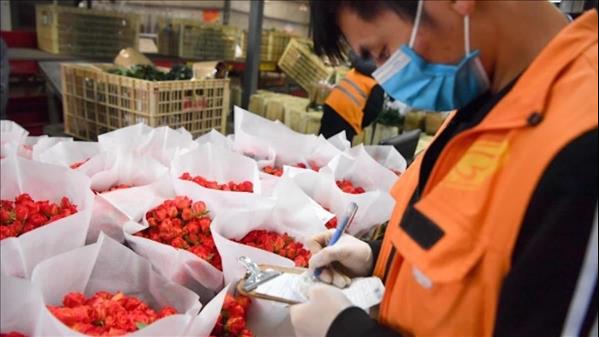(MENAFN- Asia Times) Valentine's Day was hardly the traditional love-fest for China's florists. February 14 came and went with hardly a rose in sight at Asia's largest flower market in Kunming, the capital of Yunnan province.
Stalking the massive indoor center was the threat of an invisible enemy, the Covid-19 disease. Gloom, as opposed to the scent of a fresh bloom, hung in the air.
'As sales during Valentine's Day normally account for one-third of our business for the whole year, it is estimated that the loss to the Yunnan flower industry, including supporting sectors such as logistics, during that period reached up to 5 billion yuan [US$710 million],' Wang Jihua, the deputy director of the Yunnan Provincial Academy of Agricultural Sciences , said.
Ten days later, the famed Dounan Flower Market opened for business again, complete with face marks and disinfectant. But the fallout will linger for the army of small businesses across the country that are bearing the brunt of the epidemic.
'Most firms have yet to reopen and are struggling with supply chain problems,' Tian Yulong, a spokesman for the Ministry of Industry and Information Technology, told a media briefing.
'Some industries have since resumed operations but only around three in 10 small and medium-sized enterprises are back to work. Ongoing transport disruptions [have made] it hard for workers to travel and [have] prevented the shipment of raw materials,' Tian added.
Since last month, the world's second-largest economy has shut down factories , businesses and schools in a move to curb the spread of the coronavirus, which has killed nearly 2,800 people and infected close to 84,000 worldwide .
But gradually, the world's second-largest economy is starting to stir. A survey this week of the nation's top 500 manufacturing companies showed that 97% had resumed production in 26 provinces, according to the China Enterprise Confederation.

Read: China fears the specter of mass layoffs
Read: How the coronavirus destroyed the Xi 'myth'
Read: Is China flying into a 'Black Swan' storm?
The make-up included 155 state-owned firms and more than 340 from the private sector.
'Industries included were chemicals, petrochemicals and coking, power and electrical equipment, automobiles and parts, household appliances, and pharmaceuticals,' the CEO reported.
Yet as of February 20, only 66% of employees had returned to work while on average companies were operating at about '59% of their full capacity.' Manufacturers were also facing a logistics nightmare.
'Poor inter-provincial transportation is the biggest obstacle to the normal operation of the industrial chain,' the 21st Century Business Herald reported.
Breathing new life into small- and medium-sized companies is proving more difficult despite the specter of massive layoffs.
Still, as part of the relief effort, banks were ordered earlier this week by the powerful State Council to increase loans by another 500 billion yuan, or US$71 billion, to SMEs.
'State-owned large banks are urged to increase the balance of their inclusive loans to micro and small businesses by no less than 30% year-on-year in the first half of this year … [while] national commercial banks will be encouraged to offer more loans to micro and small firms, and work toward meaningfully lowering the lending rates from last year's level,' the State Council revealed in a statement.
Another survey released by the prestigious Tsinghua University and Peking University of 1,000 SMEs illustrated the depth of the problem.
Just 34% of those polled admitted they could survive for a month on current cash flow projections. While the sample was small, the study was conducted by China's two leading academic institutions.
'The employment situation is OK in the first quarter, but if the virus is not contained by the end-March, then from the second quarter, we'll see a big round of layoffs,' Dan Wang, an analyst with the Economist Intelligence Unit , said, adding that unemployment could surge to 4.5 million.

Read: Wuhan virus rocks China's political elite
Read: Xi's propaganda push fails to mask virus gaffes
Read: Virus to wipe out millions of businesses
His view was echoed by Huang Qifan, the vice-chairman of the National People's Congress Financial and Economic Affairs Committee. He called the impact of the virus 'scarier than the epidemic itself.'
'If measures are not taken, a large number of small and medium-sized manufacturing enterprises will fail. Just as importantly, the industrial ecology of some of the more fragile manufacturing industries will be destroyed, leading to longer-term negative effects,' Huang, the former mayor of Chongqing, wrote on the Chinese-language Sina Finance website.
But manufacturing is not the only area of concern. The service sector has also become highly vulnerable.
'Consumption in hotels and cinemas has fallen sharply while a large number of small- and medium-sized enterprises are under extreme pressure as a result,' Huang said. 'For example, China's tourism industry contributed slightly more than 11% to GDP in 2017.
'The number of direct and indirect people employed in the industry exceeds 100 million. If the sector is severely hit this time, unemployment will rise, increasing pressure on social stability across the whole of society,' he added.
Creating 60% of GDP growth, the private sector accounts for around 80% of urban jobs , similar to those at the Dounan Flower Market in Kunming.
Last year, turnover at the floral exchange hit 7.44 billion yuan or roughly $1.06 billion. But the coronavirus outbreak at the start of 2020 has seen demand shrivel. 'This has been disastrous,' one flower stall owner admitted.
The same could be said for millions of small- and medium-sized companies across China. Now, they are all waiting for the economy to bloom again.
MENAFN2802202001590000ID1099771439